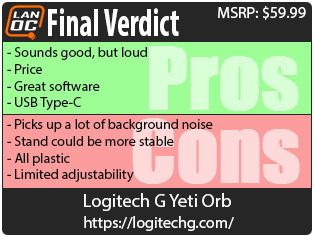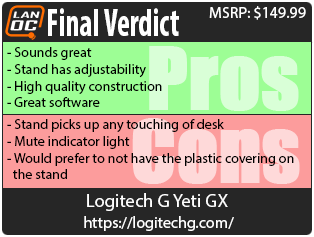Overall and Final Verdict
Hearing that the Blue Microphone brand was no longer going to be used on products was a little sad, but the silver lining in all of this is that the Yeti brand and the Blue DNA carries on even now that we are finally seeing the first Logitech G Yeti microphones. Even more than that with both the Yeti Orb and the Yeti GX we can see the history, while the Blue Snowball microphone wasn’t a Yeti model it's clear that the Orb is a continuation on that design which is designed to be a simple and affordable USB microphone. The Yeti GX then has more of the true Yeti DNA with a design that calls back to that shape but clearly has a lot of Logitech influence as well as a new focus on things that gamers and streamers didn’t care about when the Yeti brand first took off like lighting and styling as a whole.
Both microphones performed well but to me, the Yeti GX was noticeably better at reproducing my voice. Both are yet another example that if microphone quality is your concern then a desktop microphone is the minimum that you should be looking at. They have integrated the Logitech G Hub software which works across the entire Logitech Gaming lineup to simplify and minimize the number of programs that you have installed for your devices. They then have the Blue Vo!ce integration which gives functionality that years ago you could only get from using an expensive mixer. They have simplified that with profiles and a way to share and download community-made profiles as well. You also get voice effects and the ability to make your own and share/download others and samples which when combined with a Logitech keyboard or mouse you can play over the microphone like your own soundboard. They are only missing a Logitech made device similar to the Elgato Stream Deck to bring all of those effects and samples together and make it easier to use when gaming or streaming. Both microphones use USB Type-C which keeps things simple.
The Yeti GX also really stood out in its build quality with the cast aluminum housing, aluminum stand arm, and steel base, the only thing I wasn’t a fan of was covering all of that up with plastic. The Orb on the other hand is designed to be budget friendly and that shows in its construction and you can see that with everything about it and its stand being plastic. That caused another issue, the Yeti Orb can be knocked over easily with its plastic base and three legs. The GX’s stand allows a lot of adjustability whereas with the Orb you have two mounting points and that is all you can change. Both microphones would benefit from a mount that better isolates them from your desk, because of that they picked up my keyboard really well and any bump or noise from my desk could be heard. The Yeti GX did at least not pick up my mouse sounds because of its more focused pickup pattern whereas the Yeti Orb picked everything up, loudly. A lot of that can be tuned out with the software adjustability that they have at least. The Yeti GX would benefit from a boom to get a little closer to you without being in the way, but its side mount design may make that harder to do while also using something to isolate it where the old Yeti designs had the mount on the bottom.
If RGB is your thing, the Yeti GX has it and both microphones also have the Logitech logo backlit which I personally could go without. The Yeti Orb doesn’t have any way to mute the microphone on it, you will have to do that on the software level. The Yeti GX does but I think a dedicated status LED for that would be a nice addition. It is integrated into the scroll wheel but the scroll wheel also turns red when you are peaking/distorting and need to turn your gain down which could get confusing. That said I do really dig the use of the scroll wheel, it is exactly like a mouse scroll wheel and is easy to use.
For pricing the Yeti Orb has an MSRP of $59.99 which is $10 more than what the Blue Snowball used to cost. But the prices on everything have gone up that isn’t that big of a surprise. It is still a good value for how it performs, but it is also against a lot better competition these days with lots of companies aiming for that budget market. A good example of that would be the Maono PD200X USB/XLR Dynamic Microphone that I took a look at. The Yeti GX on the other hand is $149.99 which is getting up into the range that the Yeti X is/was and that had a wider frequency range and more flexibility with multiple pickup patterns. Both microphones are solid performers and have two different target audiences. They are also a great fit for the Logitech Gaming brand, especially considering how intertwined gaming and streaming are these days.


Live Pricing: HERE


Live Pricing: HERE




